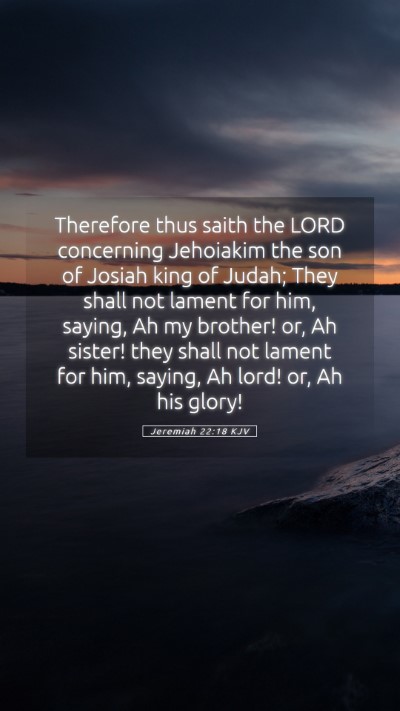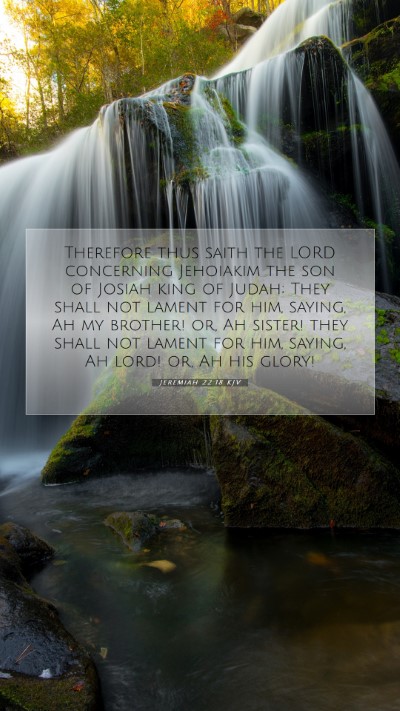Understanding Jeremiah 22:18
Jeremiah 22:18 states: "Therefore thus saith the Lord concerning Jehoiakim the son of Josiah king of Judah; They shall not lament for him, saying, Ah my brother! or, Ah sister! they shall not lament for him, saying, Ah lord! or, Ah his glory!" This verse carries profound meaning regarding the fate of King Jehoiakim and serves as a critical commentary on the nature of leadership and the consequences of failing to adhere to God’s commands.
Summary and Commentary
The verse is part of a broader prophecy communicated by Jeremiah, reflecting God’s displeasure with Jehoiakim's reign. King Jehoiakim is depicted negatively, suggesting a lack of mourning at his passing, symbolizing the deep consequences of his actions and decisions as a leader.
Insights from Public Domain Commentaries
-
Matthew Henry:
Henry comments on the absence of lamentation for Jehoiakim, pointing out that his reign was marked by oppression and idolatry. The lack of mourning indicates that his death would not be a loss to the people of Judah, highlighting their collective suffering due to his leadership. Instead of mourning, the focus is on the consequences of his sinful ways.
-
Albert Barnes:
Barnes emphasizes the political and spiritual ramifications of Jehoiakim's rule. He notes that the king's disregard for God’s commandments led to national turmoil. The refusal of the people to lament his death is indicative of their realization of the need for a righteous and faithful leader, underscoring the theme of divine judgment and the high standards expected of those in power.
-
Adam Clarke:
Clarke provides an analysis of the language used in this passage. He suggests that the lack of lamentation reflects not only the people's disillusionment with their king but also a prophetic insight into the upcoming desolation of Judah. His observations remind readers of the serious implications of leadership that turns away from God, and the long-term effects on the nation’s wellbeing.
Key Themes
-
The Weight of Leadership:
This verse highlights the heavy responsibility leaders bear, particularly when they stray from God’s path. It serves as a reminder that leaders are called to guide their people righteously or face dire consequences.
-
Divine Judgment:
God’s judgment on Jehoiakim illustrates that unfaithfulness to His commands is met with consequences. This reality serves as a warning to all not to take their spiritual obligations lightly.
-
The Absence of Mourning:
The absence of mourning signifies the people’s collective realization that Jehoiakim’s life and rule were not significant in a positive sense. It portrays a shift in public perception and allegiance towards God’s expectations.
Cross References
- 2 Kings 24:6 - Discusses the reign and actions of Jehoiakim.
- Jeremiah 36:30 - Proclaims the fate of Jehoiakim due to his disregard for God’s word.
- Isaiah 22:1-14 - Contains prophetic insights that parallel themes of judgment and leadership.
Application of the Verse in Daily Life
Understanding this verse encourages individuals, especially leaders, to reflect on their actions and decisions. Whether in spiritual, community, or personal realms, it underscores the importance of aligning one’s leadership with biblical principles. It poses a significant question: how do we want to be remembered by those we lead? The lack of lamentation serves as a powerful metaphor for any leadership that leads people away from truth and righteousness.
Conclusion
Jeremiah 22:18 serves as a profound reminder of the consequences of unfaithful leadership. By examining this verse through various commentaries, one can gain a deeper understanding of its implications not only in the context of ancient Judah but also within modern spiritual and communal leadership paradigms. This serves both as a cautionary tale and a call toward responsible and righteous living in accordance with God's will.
Further Study Recommendations
For those engaging in Bible study groups or online Bible study sessions, exploring the historical context of Jehoiakim’s reign can yield enriching discussions about leadership, faithfulness, and God’s judgment. Utilizing Bible study tools, guides, and resources can enhance understanding and interpretation of challenging passages such as this, ultimately leading to deeper Bible verse meanings and commentary insights.


